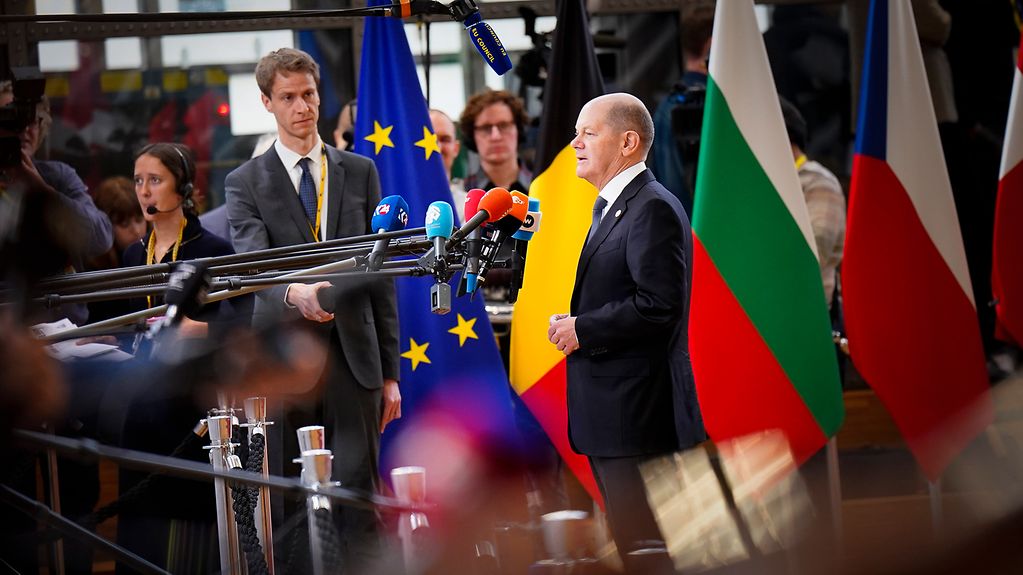European Council meeting in Brussels
The 27 member states agreed on financial support for Ukraine at a meeting of the European Council in Brussels. Member states are to provide 50 billion euros.

"We want to do everything we can to ensure that Ukraine is in a position to defend its territory," said Federal Chancellor Scholz at the European Council meeting.
Photo: Federal Government/Steffen Kugler
The heads of state and government took a joint decision on the Multiannual Financial Framework (MFF) at their summit in Brussels. This is linked to a clear commitment to financial support for Ukraine worth 50 billion euros, with 12 billion euros to be made available annually in funding for Ukraine.
Adjustment of the financial framework
"Over the past few days and weeks, it was important to me to always make one thing very clear: we need a decision by all 27 member states," said Federal Chancellor Scholz at the final press conference after the Council meeting. We must stand together as a family, as a European community – and express this through a joint decision, he said. This was good news for the European Union and Ukraine alike, Scholz said, adding that it had therefore been a very successful summit.
At their last meeting last December, 26 of the 27 EU member states had agreed a revision of the MFF. This agreement included an increase in funding of almost 65 billion euros, including 50 billion euros for the so-called Ukraine Facility, i.e. credit facilities that can be utilised as needed.
With the Ukraine Facility, the EU wants to offer the country predictable and flexible support between 2024 and 2027. In order to protect the EU's financial interests, the facility is to include a robust framework ensuring transparency, auditing and control.
What is the MFF? Since 1988, the EU has been preparing long-term budgets, also known as Multiannual Financial Frameworks (MFF) . Long-term budgets provide a stable framework with general expenditure ceilings to align spending with EU policy priorities, and make it easier for co-financiers and beneficiaries to make plans based on EU funding. Another important reason for binding longer-term financial planning is to maintain budgetary discipline. The current MFF is valid for a period of seven years.
Intense debate about military support
The heads of state and government also held intensive discussions on the issue of further military support for Ukraine. The Federal Chancellor believes that not all European partners are providing sufficient arms aid for Ukraine. "Germany is contributing a lot," said Federal Chancellor Scholz.
This year alone, more than 7.4 billion euros from the federal budget are earmarked to supply Ukraine with military equipment and ammunition. "We have commitment appropriations in place totalling another 6 billion euros over the next few years," Scholz pointed out.
However, the EU cannot make do with German support alone. We had to be very clear about the fact "that we once more need a great deal of effort from everyone", Scholz stressed, adding that bilateral support for Ukraine's defence needed to be strengthened relatively early on this year. "That must be the message that is sent out by the European Union – also in the direction of the USA," said Scholz. "I hope that today's message and the debate we are having, will help the US President to make his political endeavours at home a little easier."
Commemorating Delors
On Wednesday, before the start of the European Council meeting, Federal Chancellor Olaf Scholz attended the memorial ceremony in Brussels for the former President of the European Commission, Jacques Delors, who died in December last year. Delors is regarded as one of the most prominent and influential politicians in the development of the European Union. During his time as President of the European Commission from 1985 to 1995 he helped shape the future of the union of states. In the past, Federal Chancellor Scholz described Jacques Delors as one of the most important architects of the European Union.
In a joint article with his European counterparts, Chancellor Scholz called on the EU to provide Ukraine with sustainable and long-term military support. The article's authors acknowledge Ukraine's unbroken and exemplary will to fight, but they also identify problems: "Ukraine does not have enough artillery ammunition, and there is a risk that the pledges of military support will fall short of Ukraine's needs." An immediate and comprehensive delivery of ammunition and weapons systems from European partners to Ukraine was urgently needed, Scholz pointed out.